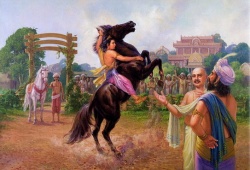Difference between revisions of "Koliya"
| Line 5: | Line 5: | ||
History | History | ||
| − | The [[Sakyan]] and [[Koliyan]] ruled on opposite banks of the {{Wiki|Rohni}} river(Rupendehi District of [[Lumbini]],{{Wiki|Nepal}}) Their members were called {{Wiki|rajas}} and their chief was the {{Wiki|maharaja}}. They had autonomy over all domestic administrative matters. However, they were not fully independent states like [[Vesali]] because both were vassal states of the neighbouring kingdom of [[Kosala]]. | + | The [[Sakyan]] and [[Koliyan]] ruled on opposite banks of the {{Wiki|Rohni}} river(Rupendehi District of [[Lumbini]],{{Wiki|Nepal}}) Their members were called {{Wiki|rajas}} and their chief was the {{Wiki|maharaja}}. They had autonomy over all domestic administrative matters. However, they were not fully independent states like [[Wikipedia:Vaishali (ancient city) |
| + | |Vesali]] because both were vassal states of the neighbouring kingdom of [[Kosala]]. | ||
The [[Koliya]] owned two chief settlements, at {{Wiki|Ramagama}} and at {{Wiki|Devadaha}}. | The [[Koliya]] owned two chief settlements, at {{Wiki|Ramagama}} and at {{Wiki|Devadaha}}. | ||
Revision as of 22:28, 18 August 2013
The Koliyas/Kolis were Kshatriya of the Adicca (Iksvaku) clan of the Solar Dynasty during the time of Gautama Buddha. They have claimed Kshatriya status themselves. Other than the Sakyans, they had no status equals in their region, and therefore, members of these two royal families married only among themselves. Both clans were very proud of the purity of their royal blood and had practiced this tradition of inter-marriage since ancient times. For example, Suddhodana's paternal aunt was married to the Koliyan ruler Anjana. Their daughters, Mahamaya and Mahapajapati Gotami, were married to Suddhodana, the chief of the Sakyans. Similarly, Yashodhara, daughter of Suppabuddha, who was Anjana’s son, was married to the Sakyan prince, Gautama Buddha. Thus, the two royal families were related by marriage bonds between maternal and paternal cousins since ancient times.In spite of such close blood-ties, there would be occasional rifts between the two royal families, which sometimes turned into open hostility.
Yashodhara(Koliyan Princess) and Rahula with Buddha, Ajanta.
History
The Sakyan and Koliyan ruled on opposite banks of the Rohni river(Rupendehi District of Lumbini,Nepal) Their members were called rajas and their chief was the maharaja. They had autonomy over all domestic administrative matters. However, they were not fully independent states like [[Wikipedia:Vaishali (ancient city)
|Vesali]] because both were vassal states of the neighbouring kingdom of Kosala.
The Koliya owned two chief settlements, at Ramagama and at Devadaha.
